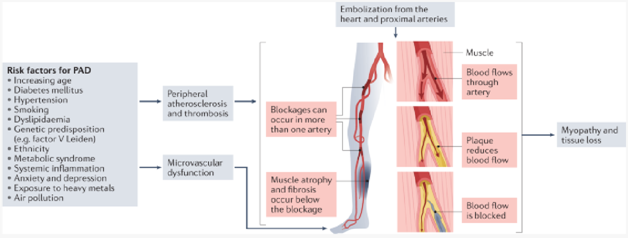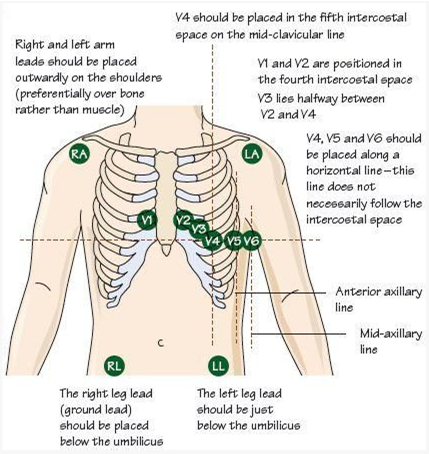The nurse has written a plan of care for a client diagnosed with peripheral arterial insufficiency. Which intervention is the most appropriate for this diagnosis?
Elevate the legs and arms above the heart when resting.
Encourage the client to engage in a moderate amount of exercise.
Encourage extended periods of sitting or standing.
Discourage walking in order to limit pain.
The Correct Answer is B
The most appropriate intervention for a client diagnosed with peripheral arterial insufficiency is: Encourage the client to engage in a moderate amount of exercise. Peripheral arterial insufficiency is a condition characterized by reduced blood flow to the extremities, typically the legs, due to narrowed or blocked arteries. Regular exercise is an important component of managing peripheral arterial insufficiency. Exercise helps improve circulation, promote collateral blood vessel development, and increase the distance a client can walk before experiencing pain (intermittent claudication). Therefore, encouraging the client to engage in a moderate amount of exercise, such as walking, under healthcare provider guidance is crucial.]

The other options are not appropriate interventions for peripheral arterial insufficiency:
Elevating the legs and arms above the heart when resting: While elevation can be beneficial for certain conditions, such as reducing swelling in venous insufficiency, it is not the primary intervention for peripheral arterial insufficiency. Elevation alone does not improve arterial blood flow and may not effectively address the underlying circulatory issues.
Encouraging extended periods of sitting or standing: Prolonged sitting or standing can further restrict blood flow and exacerbate symptoms in clients with peripheral arterial insufficiency. Encouraging regular movement and avoiding prolonged immobility is important to maintain adequate circulation.
Discouraging walking in order to limit pain: While walking may cause pain or discomfort in clients with peripheral arterial insufficiency (intermittent claudication), it is important to encourage walking as part of an exercise regimen. Walking helps improve symptoms over time and promotes overall cardiovascular health.
Nursing Test Bank
Naxlex Comprehensive Predictor Exams
Related Questions
Correct Answer is D
Explanation
Choice D: This question is crucial as it addresses the client's adherence to their prescribed medication regimen for managing high blood pressure. Consistent medication use is essential for controlling blood pressure and reducing the risk of complications associated with hypertension. The elevated blood pressure reading suggests that the current medication regimen may not be effectively controlling the client's blood pressure. By assessing medication adherence, the nurse can determine if non-adherence is contributing to the high blood pressure reading or if adjustments to the medication regimen are required.
"Have you recently taken any antihistamines?": Asking about recent antihistamine use is not directly relevant to the client's high blood pressure reading of 210/106 mm Hg. Antihistamines are medications primarily used to relieve allergy symptoms and do not typically have a significant impact on blood pressure levels.
"Have there been recent stressful events in your life?": While stress can contribute to temporary increases in blood pressure, asking about recent stressful events is not the most critical follow-up question in this situation. The client's blood pressure reading of 210/106 mm Hg indicates a severe elevation that requires immediate attention and management beyond stress reduction alone.
"Did you take any acetaminophen today?": Acetaminophen, also known as paracetamol, is a pain reliever and fever reducer. It does not typically have a significant effect on blood pressure. Therefore, asking about acetaminophen use is not the most relevant follow-up question for the client's high blood pressure reading.
Correct Answer is B
Explanation
The most appropriate nursing intervention to improve adhesion of the ECG leads on a male client with abundant chest hair is to clip the chest hair with the patient's permission before applying the leads. Chest hair can interfere with the adhesion of the ECG leads, resulting in poor signal quality and potentially affecting the accuracy of the ECG recording. By clipping the chest hair, the nurse can improve the contact between the skin and the ECG leads, allowing for better adhesion and signal transmission.
It is important to obtain the patient's permission before clipping the chest hair to respect their autonomy and ensure their comfort during the procedure. The nurse should explain the reason for clipping the hair and address any concerns or questions the patient may have.
Let's review the other options and explain why they are not the most appropriate interventions:
Using alcohol swabs to clean the skin before applying the leads: While cleaning the skin with alcohol swabs is a routine practice to remove oils and dirt that can affect adhesion, it may not be sufficient in the presence of abundant chest hair. Clipping the hair would be more effective in this situation.
Applying the leads to the arms and legs only: This option would not provide an accurate 12-lead ECG recording, as the chest leads are essential for evaluating the electrical activity of the heart from different angles. It is important to have the leads properly placed on the chest for an accurate assessment.
Rescheduling the ECG: Unless there are other valid reasons for rescheduling, such as a medical condition that contraindicates the procedure, rescheduling solely due to abundant chest hair would be unnecessary. Clipping the hair is a practical and effective solution to improve adhesion.

Whether you are a student looking to ace your exams or a practicing nurse seeking to enhance your expertise , our nursing education contents will empower you with the confidence and competence to make a difference in the lives of patients and become a respected leader in the healthcare field.
Visit Naxlex, invest in your future and unlock endless possibilities with our unparalleled nursing education contents today
Report Wrong Answer on the Current Question
Do you disagree with the answer? If yes, what is your expected answer? Explain.
Kindly be descriptive with the issue you are facing.
